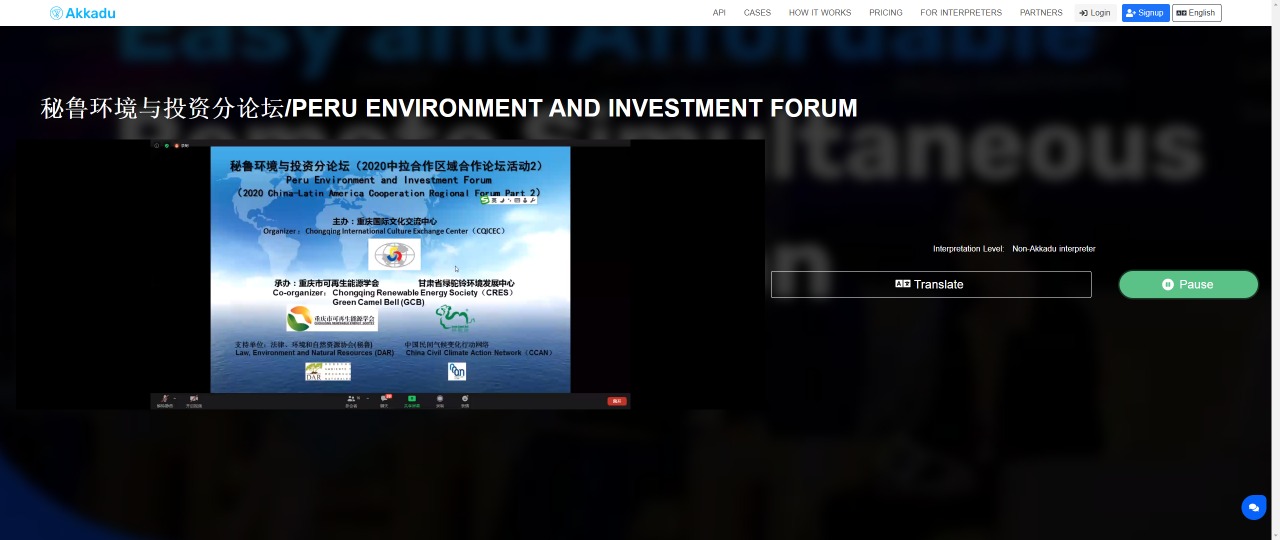- The tight commercial relationship between Peru and China, and the constant negotiation of bilateral agreements such as the FTA, makes dialogue with civil society, public officials and the private sector of China necessary to understand our mutual socio-environmental regulatory framework, even more so in the context of economic reactivation.
Beijing, Lima, August 12, 2020.- The role of China in Latin America makes an approach between the countries of the region and the Asian country necessary for a mutual understanding of investments and respect for the human rights of the populations that live in territories where extractive projects coexist.
For Jingjing Zhang, spokesperson of China Accountability Project, Chinese company leaders must aknowledge the risks to the environment, before investments are made, as well as establish a friendly relationship between communities and the company. Likewise, he considered it extremely necessary to understand environmental and indigenous people’s regulations when investing in Peru, Latin America and the Caribbean, and to implement due diligence mechanisms when carrying out projects in sensitive areas due to their biodiversity and vulnerable population.
These declarations emerged as part of the dialogue that took place last Saturday, August 8, 2020, in the virtual workshop “Peru Environment and Investment Forum (2020 China-Latin America Cooperation Regional Cooperation Forum – Part 2)”. The event aimed to explain the main issues that involve relations between Peru and China. This space was an approach to the Chinese community with the political and economic context; as well as environmental and social regulations, which are included in the investment development framework between both countries.
Knowing Peru
Mercedes Lu, spokesperson for Environmental Law Alliance Worldwide (ELAW) explained the main commercial exchange areas, based on natural resources, where risks emerge due to the lack of applicability of the regulations. She added that Peru has gone through a series of economic packages that have made the socio-environmental regulatory framework even more flexible.
On the other hand, Germán Alarco, professor at the Universidad del Pacífico (Peru), spoke about the asymmetries and challenges for the short and medium term between China and Peru. He pointed out that the differences between the two countries are not only in composition, size and estructure of the product and foreign trade; but rather policies related to strategic planning, industrial policy, productive diversification and the treatment of foreign investment. He recommended insisting on improving the tax contribution of extractive companies, including Chinese ones, since the current net contribution is very low and there are even many cases of subsidies to mining companies.
In order to give the Chinese community an overview of the Peruvian regulatory framework in socio-environmental matters that their investments must respect, Denisse Linares, specialist in Law, Environment and Natural Resources (DAR, Peru) emphasized the importance of the National Environmental Assessment System, due to its compulsory nature for the approval of investment projects. She pointed out that, in many cases, it is within the framework of this procedure that environmental regulations are violated, by not effectively complying with the provisions for the development of an environmental impact study. She reported that in Peru indigenous peoples are recognized and their right to prior consultation, which is mandatory, a notorious difference with China, where only ethnic minorities are recognized.
Within the framework of the Belt and Road Initiative, Jingjing Zhang specified the international treaties where both China and Peru are party, which implies the sustainable use of natural resources that are important to be taken into account by the Chinese business sector.
Synergies towards sustainable development
China and Peru can take advantage of these international frameworks, such as the Convention on Biological Diversity, as merging points to improve environmental standards in their commercial relations. In turn, it is important to integrate environmental standards into their FTA; even more so when China is part of the United Nations Forum on Indigenous Issues, which gives it a greater role within the framework of the recognition of these rights.
The event was co-organized with Chinese institutions, Green Camel Bell (China), China Civil Climate Action Network (China), Chongqing Renewable Energy Society (China), Chongqing International Culture Exchange Centre (China) and Environmental Law and Natural Resources (Peru), member of the Regional Coalition for Transparency and Participation and of the Regional Group on Financing and Infrastructure, as a partner in Latin America and the Caribbean.


